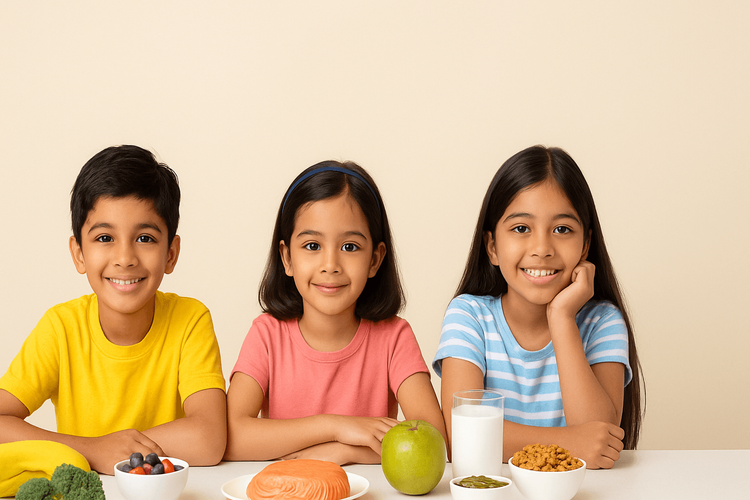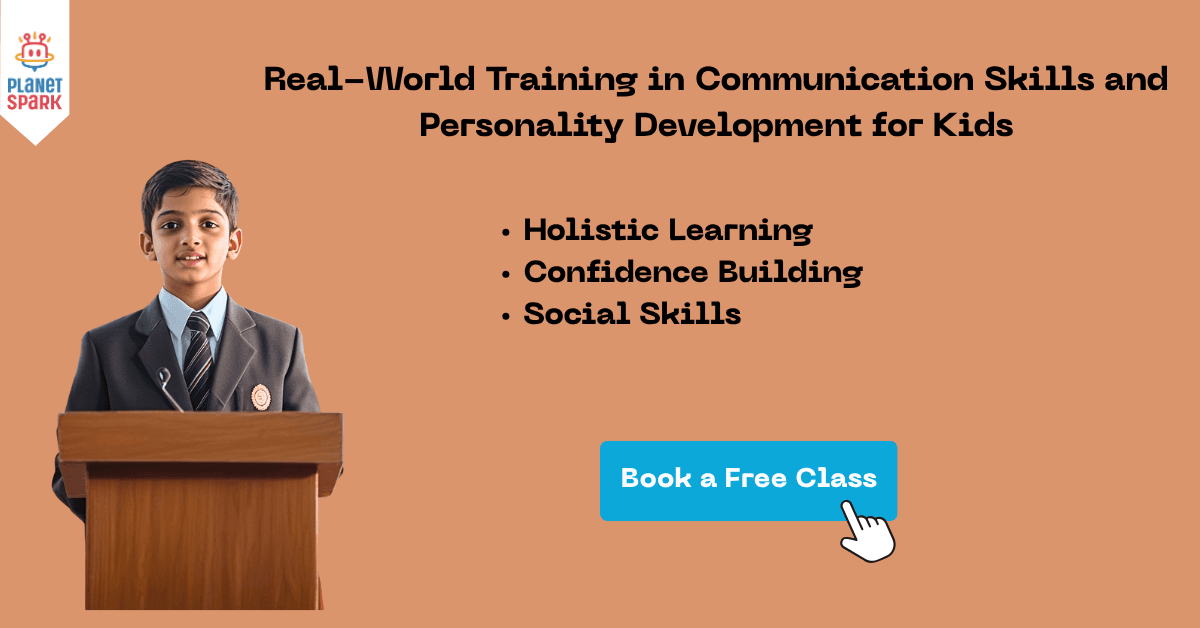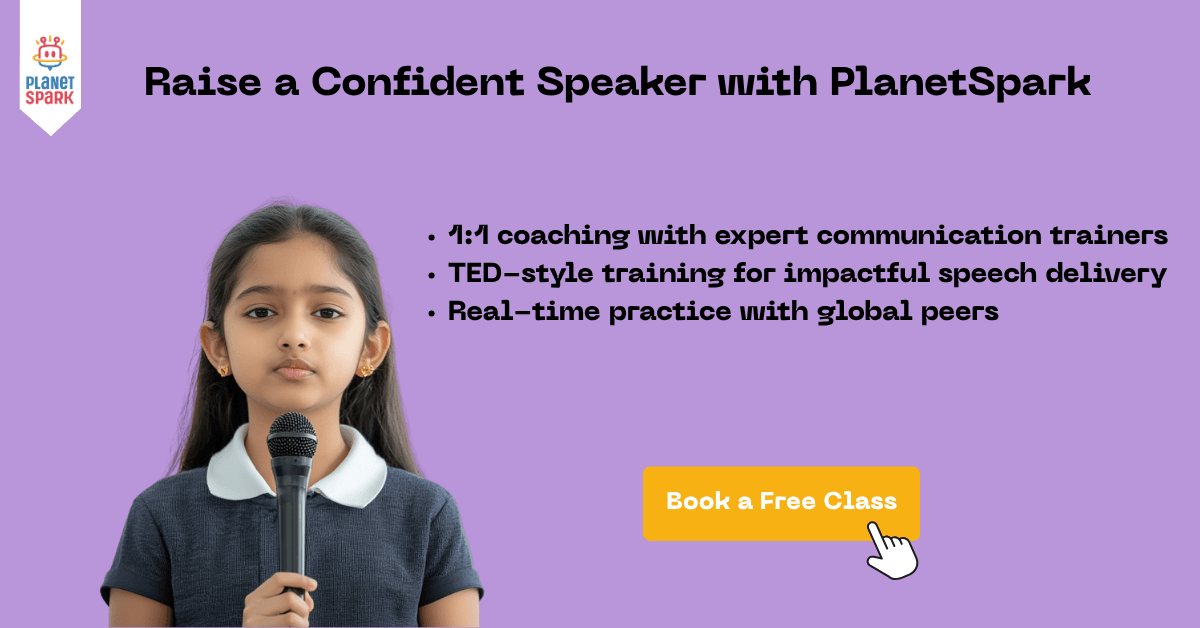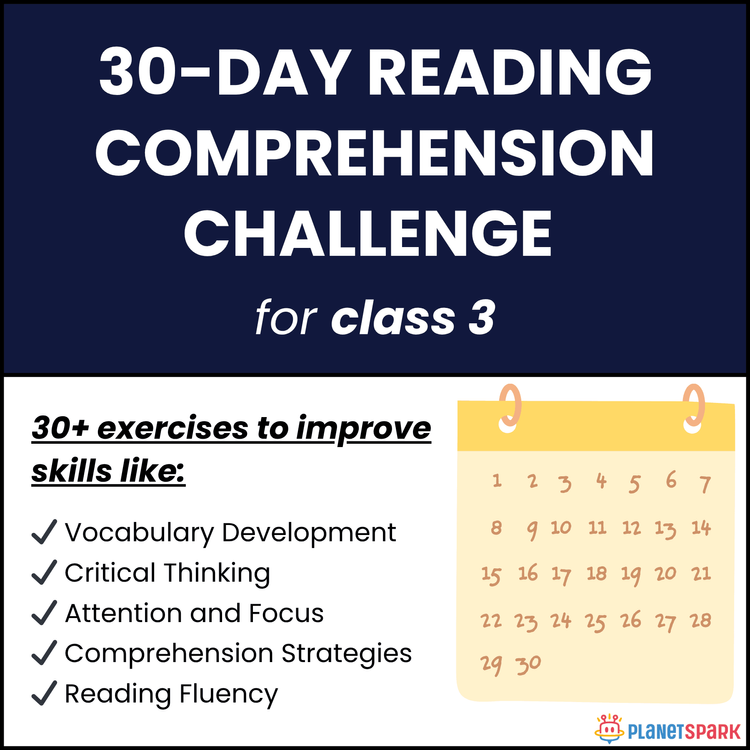Brain Development Food for Kids: Nutrition for a Smarter Future
Last Updated At: 7 Aug 2025
8 min read

Table of Contents
- Why Nutrition Matters for Brain Development
- Key Nutrients That Help a Child’s Brain Grow
- Top 15 Brain Development Foods for Kids
- How Brain-Boosting Foods Help at Different Growth Stages
- Brain Boosting Meal Ideas for Kids
- Healthy Habits That Go With Brain Food
- Indian Brain Food Traditions That Still Work
- Signs Your Child Might Need Better Brain Nutrition
- Take Brain Development Beyond Food with Public Speaking
- Frequently Asked Questions (FAQs)
A child's brain grows rapidly during the early years of life. What they eat plays a major role in how well their brain develops. Choosing the right brain development food for kids can boost memory, concentration, learning, and emotional health. This blog will guide you through the best foods and tips for nurturing a healthy, sharp mind.
Feeding the brain is just the start.
Book a free demo at PlanetSpark!
Why Nutrition Matters for Brain Development
Children’s brains are like sponges, they absorb everything around them. But just like a sponge needs water to function, the brain needs the right nutrients. A poor diet can lead to reduced attention span, poor academic performance, and mood swings. On the other hand, a balanced diet full of brain-boosting nutrients builds strong cognitive skills and emotional resilience.

Key Nutrients That Help a Child’s Brain Grow
Different nutrients play different roles in brain health. Here are the most important ones:
1. Omega-3 Fatty Acids
Builds brain cell membranes
Improves memory and learning
Found in: fish (like salmon), flaxseeds, walnuts, chia seeds
2. Iron
Carries oxygen to the brain
Improves focus and energy levels
Found in: spinach, beans, fortified cereals, red meat
3. Zinc
Supports brain signaling
Essential for memory and attention
Found in: lentils, chickpeas, cashews, pumpkin seeds
4. Vitamin B Complex
Helps brain produce energy
Supports nerve function and mood
Found in: eggs, dairy, whole grains, green vegetables
5. Antioxidants (Vitamin C & E)
Protects brain cells from damage
Supports mental alertness
Found in: berries, citrus fruits, spinach, sunflower seeds
Sharp minds deserve strong voices.
Enroll in PlanetSpark’s Public Speaking course!
Top 15 Brain Development Foods for Kids
Let’s explore the best everyday foods that can support your child’s brain power:
1. Eggs
Rich in protein and choline
Helps with brain development and memory
Easy to include in breakfast
2. Salmon
Full of omega-3s (DHA and EPA)
Supports brain growth and improves attention
Can be grilled, added to sandwiches or pasta
3. Walnuts
Known as the "brain-shaped" nut
Improves memory and brain cell connections
Great as a snack or in desserts
4. Berries (Blueberries, Strawberries)
High in antioxidants
Improves learning and memory
Add to cereals, smoothies, or yogurt
5. Oats
Great source of fiber and energy
Keeps brain active through the day
Easy breakfast option
Good nutrition fuels focus.
Book your PlanetSpark class today.
6. Green Leafy Vegetables (Spinach, Kale)
Full of iron and folate
Boosts focus and cognitive skills
Add to parathas or make tasty green smoothies
7. Milk and Dairy Products
Provide vitamin D, protein, and B vitamins
Supports brain tissue growth
Ideal in milkshakes or cheese sandwiches
8. Bananas
Rich in potassium and magnesium
Boosts energy and mental performance
Easy to eat on-the-go
9. Pumpkin Seeds
Contain magnesium, iron, zinc, and copper
Improve mood and memory
Mix with dry fruits as a healthy trail mix
10. Turmeric (Haldi)
Curcumin improves memory and reduces inflammation
Can be added to milk or curries
11. Carrots
High in beta-carotene
Supports brain function and eye health
Include in lunchboxes as sticks or in soups
12. Avocados
Packed with healthy fats
Supports blood flow to the brain
Can be added to sandwiches or toast
Brain food builds potential.
Enroll at PlanetSpark to unlock it.
13. Whole Grains (Brown rice, Whole wheat)
Provides steady glucose energy
Helps with concentration and focus
Include in chapatis, dosas, or porridge
14. Chia Seeds
High in omega-3, calcium, and antioxidants
Helps improve brain and bone health
Add to puddings, smoothies, or cereals
15. Sweet Potatoes
Rich in vitamin A and antioxidants
Helps brain development and immune function
Bake, mash, or make fries

How Brain-Boosting Foods Help at Different Growth Stages
Every stage of a child’s growth—from toddler to teenager—requires specific nutrients to support brain development. Just as physical growth needs proper fuel, so does mental and emotional growth. Understanding how food supports different developmental stages helps parents make better choices at the right time.
Infants and Toddlers (0–3 Years)
This is the most crucial phase of brain development. During the first 1,000 days of life, a child’s brain grows at a rapid pace. Nutrients like omega-3 fatty acids, iron, and choline are vital.
Breast milk provides natural DHA and choline
Mashed eggs, lentils, and banana are easy to digest and brain-friendly
Introduce iron-rich foods like spinach puree and fortified cereals
Tip: Avoid added sugar and excess salt at this stage. The brain needs clean energy.
Preschoolers (3–6 Years)
Children start learning social skills, language, and basic logic. This is the stage when you can build a strong eating habit for brain health.
Serve whole grains like oats or ragi for slow-releasing energy
Add berries, carrots, and avocados for focus and memory
Keep milk and dairy in the diet for calcium and vitamin B
Tip: Present food in fun shapes or colorful plates to make them appealing.
Great minds begin with great meals.
Book a session with PlanetSpark.
School-Age Kids (6–12 Years)
This is a high-demand age group. Kids face pressure in academics, sports, and emotional development. Their brain needs nutrients that improve memory, alertness, and mood regulation.
Give fish (like salmon) or walnuts for omega-3s
Pack pumpkin seeds, trail mix, or boiled eggs in lunchboxes
Encourage brain-boosting smoothies with chia seeds and fruits
Tip: Keep them hydrated. Even mild dehydration can affect memory and attention.
Teenagers (13–18 Years)
Teen brains are still developing, especially the frontal cortex, which handles decision-making and emotional control. Their bodies need more energy, so poor diet can affect mental health too.
Include high-protein options like paneer, chicken, or tofu
Replace junk food with roasted makhana, bhel with nuts, or homemade snacks
Ensure iron intake to prevent fatigue and brain fog
Tip: Encourage teens to plan their meals. Involving them increases ownership and healthy choices.

Brain Boosting Meal Ideas for Kids
Here are a few child-friendly ideas to include brain development food for kids in their daily diet:
Breakfast
Scrambled eggs with spinach
Oatmeal topped with berries and walnuts
Banana smoothie with chia seeds
Lunch
Whole wheat roti with paneer and greens
Rice with salmon or dal and spinach
Cheese and avocado sandwich
Dinner
Grilled fish or chicken with sweet potato mash
Veg pulao with pumpkin seeds
Khichdi with ghee and carrots
Snacks
Fruit salad with yogurt and honey
Trail mix with almonds, walnuts, and raisins
Boiled eggs or banana with peanut butter
Sharp minds need strong voices.
Enroll in PlanetSpark’s course.
Healthy Habits That Go With Brain Food
Just food isn’t enough. Combine the right food with healthy habits for best results:
Hydration: Encourage your child to drink enough water
Sleep: 9–11 hours of sleep is important for brain growth
Physical Activity: Active kids think better and feel better
Less Sugar: Too much sugar can slow down memory and learning
Indian Brain Food Traditions That Still Work
Indian kitchens are full of natural brain-boosting foods. These traditional items can still work wonders:
Haldi Doodh (Turmeric Milk): A bedtime drink that improves memory
Desi Ghee: Healthy fats for brain and bone strength
Soaked Almonds: Improves brain sharpness when eaten in the morning
Ragi (Finger Millet): High in calcium and iron, supports learning and growth
Makhana: Great crunchy snack with iron and magnesium
Signs Your Child Might Need Better Brain Nutrition
Keep an eye out for these signals:
Short attention span or easily distracted
Poor school performance
Frequent tiredness or irritability
Lack of interest in learning
Forgetfulness
If these show up often, it’s time to review their diet.
Take Brain Development Beyond Food with Public Speaking
While brain-boosting foods fuel intelligence, real growth comes when kids learn to express that intelligence confidently. That’s where PlanetSpark’s Public Speaking course makes a powerful difference.
Designed for children aged 4 to 16, the course helps kids turn their sharp thinking into bold expression. With 1:1 coaching, TED-style speech training, and real-time practice with global peers, your child learns how to speak clearly, confidently, and convincingly—whether in class, competitions, or everyday conversations.
Help your child pair mental strength with powerful communication.
Book a free demo with PlanetSpark today and unlock their full potential.
Frequently Asked Questions (FAQs)
Q1. What are the best foods for brain development in kids?
Foods rich in omega-3 (like fish and walnuts), iron (like spinach and lentils), antioxidants (like berries), and healthy fats (like avocados) are excellent for boosting memory, focus, and learning in children.
Q2. Can nutrition really affect my child's learning and communication skills?
Yes! A balanced diet improves brain function, concentration, and emotional regulation—all of which directly impact a child’s ability to speak confidently and think clearly.
Q3. What is PlanetSpark’s Public Speaking course all about?
PlanetSpark offers 1:1 online classes to help kids develop stage confidence, speech clarity, storytelling skills, and persuasive communication through TED-style training and live practice.
Q4. At what age can my child join the PlanetSpark Public Speaking program?
Children as young as 4 years old can start. The program is designed for kids aged 4–16, with personalized modules based on their age and skill level.
Q5. How does public speaking complement brain development in kids?
Public speaking strengthens cognitive abilities like critical thinking, idea structuring, and emotional intelligence—helping children express their thoughts clearly and confidently.
Q6. How can I get started with PlanetSpark?
You can simply book a free demo on PlanetSpark’s website. A certified trainer will assess your child’s speaking level and suggest the best learning path.
Download Free Worksheets
Personalized Communication Report
Record a video to get a AI generated personalized communication report for your child
Select Learner's Class

Hi There, want to try these
tips for your child with
LIVE with our expert coach?
Let's check your child's
English fluency
